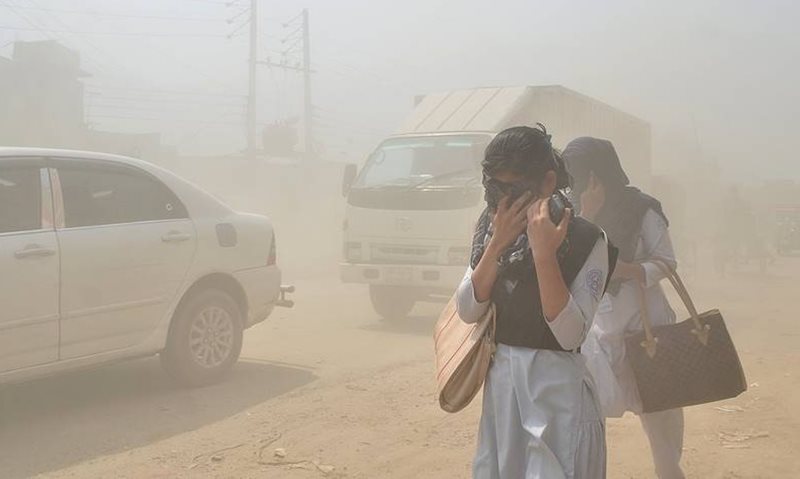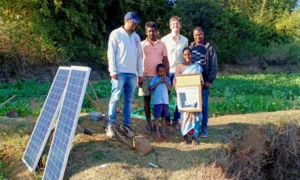Ahead of the assembly elections in Uttar Pradesh, a survey conducted across six cities of the poll bound state – Lucknow, Kanpur, Varanasi, Agra, Gorakhpur, and Meerut – found that 83 per cent of the respondents believe ‘air pollution is a climate change issue’. And 76 per cent said that air pollution should be addressed as an election issue by political parties in the upcoming elections. Further, 95 per cent of the respondents believed that climate change has an impact on the state’s economy.
These findings of the survey, which was conducted last month in January 2022 to understand public awareness about climate change in Uttar Pradesh, were released today, February 4, during a webinar titled ‘Is the Uttar Pradesh Voter Thinking About Climate Change?’
During the webinar, panelists stressed that better public communication was the key to addressing the climate crisis at a political level.
“The campaign to curb tobacco is exemplary. The increased public awareness through the use of ad-films and other forms of media has been followed by legislative action and setting of rules that now ban smoking in public areas. Similar results can be achieved in informing people, especially in the rural areas about the adverse effects of climate change,” said Seema Javed, a environmental communications expert, in the webinar.
The news of destructive landslides in the neighbouring Uttarakhand has led to an increased level of awareness amongst the rural population in Uttar Pradesh, said Javed. “These people [rural citizens] are far more likely to be directly affected by the changing climate as the entire calendar in the rural areas revolves around weather which eventually impacts cultivation,” she added.
The webinar was based on the findings of a survey jointly conducted by Climate Trends, a Delhi-based strategic communications company, and YouGov, a London-based data analytics firm.
Key findings of the survey
The survey, with a sample size of 1,215, has provided some important insights.
- 47 per cent respondents agree that their city’s air quality is not good.
- 73 per cent said that vehicular emissions are the single biggest cause of air pollution.
- 64 per cent of respondents mentioned that planting more trees by the government can lessen air pollution.
- Awareness was higher (88 per cent) in the respondents from the age group of 25-44 years.
- 95 per cent of respondents believe that climate change has an impact on the state’s economy.
Explained: How air pollution affects monsoon rains in India
‘Public communication needs to link climate change with its indirect impacts’
During the webinar, Ajay Nagpure, Head, Air Quality at the World Resource Institute (WRI), pointed out that often people have to live with the destructive impact of climate change but fail to see its link with their miseries.
“A problem becomes an issue when people link their problems to a common cause. People are facing problems like respiratory diseases and high blood pressure but somehow are not informed about how climate change is contributing to their health crises. Public communication is the key for climate change to become an issue and get political attention,” Nagpure asserted.
Meanwhile, Shalu Agrawal who works as a Senior Program Lead at the Delhi-based non profit organisation named Council on Energy, Environment and Water (CEEW), underlined that the politicisation of electricity prices has had a detrimental effect on the power sector.
“It is widely seen that the availability of electricity today is far better in the state [Uttar Pradesh] than it was 15-20 years ago. The power sector in India is mainly concerned with providing electricity to the consumers… there is a rising political trend to politicise power prices and provide cheap electricity,” Agrawal said in the webinar.
“The losses in the power sector mean that its ability to come up with greener alternatives is reduced and the governments have less money to provide better health services and welfare projects,” she added.
Awareness about air pollution rising in UP
SN Tripathi, professor at the Indian Institute of Technology Kanpur and a member of the steering committee on the National Clean Air Programme (NCAP), stated that a realisation on air pollution is gradually building up in Uttar Pradesh.
“I believe that the people are actually aware about the destructive impact of climate change and it has led to politicians now approaching scientists like me to come up with ideas on how to combat the menace of climate change,” the professor said. “I won’t say that the entire picture is rosy but things are indeed pacing up with regards to climate change finding mention in governance,” he added.
‘Need to inform rural citizens’
Interestingly, Karuna Nidhan Srivastava, review officer at the Lucknow bench of Allahabad High Court stated that the contribution of urban areas in environmental pollution is far more than the rural hinterland in the country.
“If you wish to see a clean flowing river, you’ll have to venture out of the cities and drive far away from the urban settlement and enter the rural belt to find clean water. Behavioural change is immensely needed in a participative democracy. Not everything can be fixed by the government, a citizen also has to contribute in ensuring a less polluted environment which further leads to climate change,” Srivastava said.
Explained: Here’s how climate change will impact India’s winter season this year
“It is important to realise that a citizen is not only a voter. He or she is also a consumer and a polluter and also a taxpayer. We need to remember this when talking about climate change,” he added.
Echoing Srivastava’s remarks, Pravin Kumar, Lucknow-based resident editor of The Times of India said that it is not necessary that the respondents of the survey, who believe that air pollution is causing climate change and should be an election-issue, are themselves taking up measures like using public transport.
“On paper it looks very pleasant that eighty per cent of the respondents are saying the right thing but they themselves might be faltering on things that cause climate change,” Kumar said.
He also pointed out that the survey was primarily conducted in the urban areas where voting percentage is always lesser than the rural areas.
“Unless people in the rural areas are well informed about the issue, it is hard for climate change to become a poll issue in the Uttar Pradesh elections,” the review officer added.



















